Alabama woman who left US to join Islamic State loses round in court

An Alabama woman who joined the Islamic State lost a first round on Monday in a legal fight to return to the U.S. with her toddler son, even as a judge seemed to support at least one argument made by her lawyer for her U.S. citizenship. U.S. District Judge Reggie Walton denied a request for “expedited” proceedings for Hoda Muthana, whose lawyers sought to have her lawsuit litigated on an emergency schedule so she could get out of a refugee camp in Syria and back to the U.S. Walton said Muthana’s lawyers failed to establish that the woman and her 18-month-old son face imminent danger in allied custody as the U.S. prepares to withdraw most of its forces from the fight against the Islamic State in Syria. Secretary of State Mike Pompeo said in a radio interview that she is not a citizen, and it would be a “risk” to let her back into the United States. “In fact, she’s a terrorist, and we shouldn’t bring back foreign terrorists to the United States of America,” Pompeo said in an interview with WOC Radio in Iowa. Muthana, who married three Islamic State fighters during her time with the group, says she now regrets joining and wants to return to the U.S. for the sake of her child, even if that means facing criminal charges. The U.S. has determined that the 24-year-old Muthana isn’t a citizen because her father was a Yemeni diplomat to the United Nations when she was born in New Jersey. Children of diplomats are not entitled to birthright citizenship because they and their parents aren’t subject to U.S. law. Her lawyers argue that her father’s diplomatic status ended before her birth in October 1994 and, therefore, she was automatically a citizen. The U.S. says it wasn’t notified that his status had changed until February 1995, apparently because of a delay in reporting it by the U.N., and therefore he was still a diplomat. The government determined her U.S. passport was issued by mistake and revoked it while she was abroad in January 2016, under President Barack Obama. Attorney Charles Swift told Walton that diplomatic status should end when a country decides it has ended, not when the U.S. gets around to recognizing it. Otherwise it would create a scenario in which a person could commit a crime and be protected by diplomatic immunity even after the sponsoring country had revoked the status. He suggested a hostile country could use this uncertainty to commit espionage. The judge called this a “valid argument,” but did not indicate how he would rule on overall question of her citizenship. Swift later told reporters he was “very encouraged” by this response and expects a decision in the case as early as this summer. “The judge’s comments certainly foreshadow the ultimate outcome of this case,” he said. Republished with permission from the Associated Press.
Judge to consider return for Alabama woman who joined ISIS

A federal judge in Washington has agreed to move quickly on a lawsuit filed by a former Alabama woman who joined the Islamic State and wants to return to the United States. The family of 24-year-old Hoda Muthana filed suit last week against the Trump administration after the government said she wasn’t a citizen and wouldn’t be allowed to enter the U.S. with her 18-month-old son. Her family sought expedited action on her suit because Muthana is now in a refugee camp in Syria. Judge Reggie Walton granted that Tuesday and scheduled a hearing for Monday. The U.S. determined Muthana wasn’t a citizen because her father was a Yemeni diplomat when she was born in New Jersey. But her lawyers say he was no longer a diplomat at the time. Republished with permission from the Associated Press.
Will Davis: The state of our union is strong
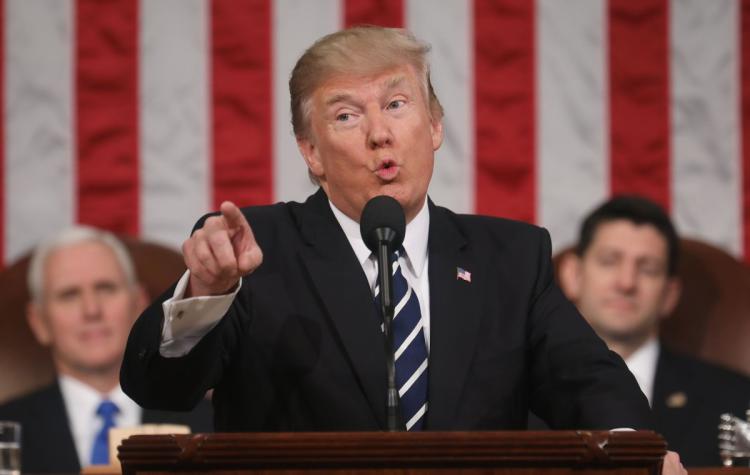
When it comes to the annual State of the Union address, much is often said, but little is actually addressed. The event exists as an opportunity for politicians to repeat their favorite platitudes and for the D.C. political class to rub shoulders. What really matters is not the State of the Union address, but what proceeds it. We are now one year into Donald Trump‘s presidency and conservatives have to be happy, maybe even pleasantly surprised at what President Trump and this Republican Congress have been able to accomplish in one year. Conservatives are used to the Republican party letting us down, but this year has been different. We’ve seen one of the largest tax cuts in American history, which corresponded with the first remaking of the tax code since Ronald Reagan‘s presidency. We have already seen the results of this tax cut come to fruition, including in our home state of Alabama where Toyota and Mazda announced a new $1.6 billion plant in Huntsville that will create 4,000 new jobs for Alabamians. The United States also saw its first year of 3% GDP growth since George W. Bush‘s first term. In addition, we have also confirmed great constitutionalist judges, including Justice Neil Gorsuch to the Supreme Court. Through remaking the courts, we have a chance to end judicial tyranny in this country and restore the rule of law. The promise of appointing judges after years of activist court rulings was a big reason why some skeptical conservatives held their nose to vote for Donald Trump. He has delivered in this area more than any of us could have expected. Lastly, many concerns about Trump’s presidency involved his foreign policy. Many folks were concerned that somebody with no experience would have significant trouble in the area where the President has the most power and the most responsibility. Yet Trump has assuaged those concerns in his first year in office. He has surrounded himself with some of the most brilliant minds in the country including the likes of Jim Mattis, Nikki Haley, and Mike Pompeo. In Trump’s first year, ISIS is all but done, Jerusalem has finally been recognized as the Capital of Israel, Syria has ceased use of their chemical weapons program, and Iran and Russia have been put on notice. Our foreign policy has made some of the greatest strides in a generation, thanks to this administration. With the economy roaring, the Middle East stabilizing, and the Supreme Court headed in a constitutionalist direction, it’s fair to say that the state of our union is strong. Welcome to Donald Trump’s America, where ISIS is dead and the economy is alive. ••• William Davis is a sophomore at the University of Alabama. There he is involved in various conservative groups and organizations.
Donald Trump approves plan to create independent cyber command
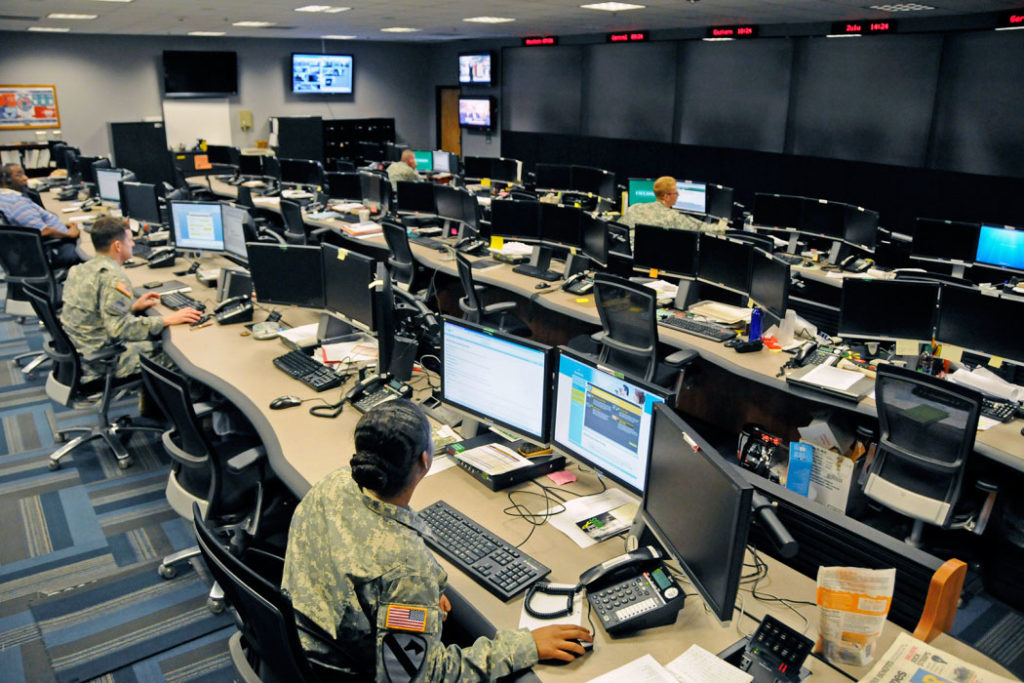
President Donald Trump has approved a long-delayed Pentagon plan to create an independent and more aggressive cyber command in order to beef up cyberwar operations against the Islamic State group and other foes. The White House announcement Friday means U.S. Cyber Command may eventually be split off from the intelligence-focused National Security Agency. For now, Trump has agreed to raise the stature of Cyber Command within the military and give it more autonomy. “This new Unified Combatant Command will strengthen our cyberspace operations and create more opportunities to improve our nation’s defense,” Trump said in a written statement. “The elevation of United States Cyber Command demonstrates our increased resolve against cyberspace threats and will help reassure our allies and partners and deter our adversaries.” Making cyber an independent military command will put the fight in digital space on the same footing as more traditional realms of battle on land, in the air, at sea and in space. The move reflects the escalating threat of cyberattacks and intrusions from other nation states, terrorist groups and hackers, and comes as the U.S. faces ever-widening fears about Russian hacking following Moscow’s efforts to meddle in the 2016 American election. The goal is to give Cyber Command more autonomy, freeing it from any constraints that stem from working alongside the NSA, which is responsible for monitoring and collecting telephone, internet and other intelligence data from around the world – a responsibility that can sometimes clash with military operations against enemy forces. Sen. John McCain praised the move, saying the administration must now develop a clear policy and strategy for deterring and responding to cyber threats. Kenneth Rapuano, the assistant secretary of defense for homeland defense, told reporters Friday that elevating the status of Cyber Command will give it a bigger voice in advocating for resources to fight cyber threats. The plan has been languishing since last year when then-Defense Secretary Ash Carter sent a proposal to President Barack Obama to make Cyber Command an independent military headquarters and break it away from the NSA. At the time, he believed that the NSA’s desire to collect intelligence was preventing the military from eliminating IS’ ability to raise money, inspire attacks and command its widely dispersed network of fighters. After Trump’s inauguration, officials said Defense Secretary Jim Mattis endorsed much of the plan. But debate over details dragged on for months. Officials say the Pentagon plan sent to the White House calls for Army Lt. Gen. William Mayville to be nominated to lead Cyber Command, although that has not been announced. Leadership of the NSA could be turned over to a civilian. The U.S. has long operated quietly in cyberspace, using it to collect information, disrupt enemy networks and aid conventional military missions. But as other nations and foes expand their use of cyberspying and attacks, the U.S. is determined to improve its ability to incorporate cyber operations into its everyday warfighting. The NSA, however, has a great deal of expertise, and officials acknowledge it will take some time for a more independent Cyber Command to get up to speed. Until then, Cyber Command and NSA will operate under a single, “dual-hatted” military commander. The cyber operation currently relies on the NSA’s expertise, staff and equipment. The two highly secretive organizations, based at Fort Meade, Maryland, have been under the same four-star commander since Cyber Command’s creation in 2009. But the Defense Department has been agitating for a separation, perceiving the NSA and intelligence community as resistant to more aggressive cyberwarfare, particularly after the Islamic State’s transformation in recent years from an obscure insurgent force into an organization holding significant territory across Iraq and Syria and with a worldwide recruiting network. While the military wanted to attack IS networks, intelligence objectives prioritized gathering information from them, according to U.S. officials familiar with the debate. They weren’t authorized to discuss internal deliberations publicly and requested anonymity. Cyber Command was created by the Obama administration to address threats of cyber espionage and other attacks. It was set up as a sub-unit under U.S. Strategic Command to coordinate the Pentagon’s ability to conduct cyberwarfare and to defend its own networks, including those that are used by combat forces in battle. Officials originally said the new cyber effort would likely involve hundreds, rather than thousands, of new employees. Since then, the command has grown to more than 700 military and civilian employees. The military services also have their own cyber units, with a goal of having, by Sept. 30, 2018, a total of 133 fully operational teams with as many as 6,200 personnel. Republish with permission of The Associated Press.
Blake Dowling: Wise Kim meets Leon County

The “Leon Consulate of Florida” was overthrown this week, thanks to the chumps at the Moroccan Islamic Union-Mail. I suppose they meant Leon County, since this hacking wing of ISIS hasn’t quite mastered English. What they refer to is the Leon County (North Florida) website; it was indeed hacked for a couple of minutes, replaced with this creepy message: County officials responded immediately that the attack was only “surface level” and all sensitive data was protected behind a firewall. Perhaps the county needed a little distraction from the FBI-fueled barrage of media coverage over the past couple of weeks. Good job Kim. If you check out the Facebook page — although I would not recommend it, as the National Security Agency and FBI might be tapping on your door, or you might make a list you would rather not be on — you will see a warning to all that this group is going to be attacking “the most important sites in the world” over the next few days. So look out Andrew Gillum, Chris Christie, John Morgan and Tmz.com — this means you. Tighten up those websites. Apply patches, run updates, don’t host sites in an unsecured location etc. Although it appears this particular hack did squat in our Capital City, what happens when one actually wreaks havoc? In last week’s Petya ransomware attack, a few firms got hit hard. Reckitt Benckiser (Britain), the maker of Norofen tablets, Durex condoms, and other quality products, are still partially down as of this writing. They got pummeled; manufacturing, shipping, ordering, all disrupted. The global tab for this attack could reach $100 million, the company estimates. Some firms pay ransom to try and get their data back, but the bitcoin payments were made and (poof) nada. So, unlike similar recent attacks, this one appears to have launched just to create chaos and digital destruction in a specific area. We will see a lot of this in the near future as nation-states wish to wage cyberwarfare with one another versus more traditional combat. Besides Wise Man Kim, no one else seems to want WW3, but if it came down to that, here are the current Top 5 militaries most likely to come out on top. A local CBS affiliate is about to enter my office for a quick segment about cybersecurity, so allow me to wrap this up with some ways to protect your business or organization from hackers and threats. Step 1: Strong password. Step 2: Antivirus and antispam solutions. Step 3: Firewall. Step 4: Robust backup. Step 4: Don’t piss off CNN. Step 5: Training. Steps 1 through 4 used to be enough, but people aren’t getting the message. Users are still clicking where they shouldn’t, so they must be trained, followed up by intrusion testing (try this test for your staff). Next, more training; even then, you won’t be 100 percent protected, but you will minimize risk. As far as best practices go, that is a good path. In closing, I hope Wise Kim gets back to his party island and stops with the missile shenanigans, that will only end badly for him and the world. I hope CNN gets back to broadcasting news, and that no one else gets subpoenaed in Tallahassee for CRA-Gate. We need some good news in our region (like local hero Walter, nice work sir: That’s it for today, have an awesome weekend. ___ Blake Dowling is CEO of Aegis Business Technologies, enjoys the Allman Brothers Band, the writings of Hemingway, and any movie with Pauly Shore. He can be reached at dowlingb@aegisbiztech.com.
Donald Trump claims ‘absolute right’ to share info with Russia

Pushing back against allegations of damaging intelligence disclosures, President Donald Trump’s national security adviser insisted Tuesday that Trump’s revelations to Russian officials about the terrorist threat from the Islamic State group were “wholly appropriate” and amounted to a routine sharing of information. H.R. McMaster added that none of the U.S. officials present for the president’s Oval Office meeting with the Russian foreign minister last week “felt in any way that that conversation was inappropriate.” He used the words “wholly appropriate” nine separate times. Trump himself claimed the authority to share “facts pertaining to terrorism” and airline safety with Russia, saying in a pair of tweets he has “an absolute right” as president to do so. Trump’s tweets did not say whether he revealed classified information about IS, as published reports have said and as a U.S. official told The Associated Press. McMaster, in a White House briefing, said: “In the context of that discussion, what the president discussed with the foreign minister was wholly appropriate to that conversation and is consistent with the routine sharing of information between the president and any leaders with whom he is engaged.” He cast some of Trump’s revelations as information that was available from publicly available “open-source reporting” and added that the president did not know the precise source of the intelligence he had shared, suggesting that Trump could not have compromised confidential sources. Still, the White House has not expressly denied that classified information was disclosed in the Oval Office meeting between Trump and Russian diplomats last week. The Kremlin dismissed the reports as “complete nonsense.” The news reverberated around the world as countries started second-guessing their own intelligence-sharing agreements with the U.S. A senior European intelligence official told the AP his country might stop sharing information with the United States if it confirms that Trump shared classified details with Russian officials. Such sharing “could be a risk for our sources,” the official said. The official spoke only on condition that neither he nor his country be identified, because he was not authorized to discuss the matter publicly. On Capitol Hill, Democrats and Republicans alike expressed concern about the president’s disclosures. Sen. John McCain, R-Ariz., called the reports “deeply disturbing” and said they could affect the willingness of U.S. allies and partners to share intelligence with the U.S. Senate Majority Leader Mitch McConnell called the intelligence uproar a distraction from GOP priorities such as tax reform and replacing the health care law. “I think we could do with a little less drama from the White House on a lot of things so that we can focus on our agenda,” he told Bloomberg Business. Doug Andres, a spokesman for House Speaker Paul Ryan, said the speaker was looking for “a full explanation of the facts from the administration.” Minority Leader Chuck Schumer, D-N.Y., called for Congress to have immediate access to a transcript of Trump’s meeting with the Russians, saying that if Trump refuses, Americans will doubt that their president is capable of safeguarding critical secrets. Trump said in his tweets, “I wanted to share with Russia (at an openly scheduled W.H. meeting) which I have the absolute right to do, facts pertaining … to terrorism and airline flight safety. Humanitarian reasons, plus I want Russia to greatly step up their fight against ISIS & terrorism.” As President I wanted to share with Russia (at an openly scheduled W.H. meeting) which I have the absolute right to do, facts pertaining…. — Donald J. Trump (@realDonaldTrump) May 16, 2017 Trump shared details about an Islamic State terror threat related to the use of laptop computers on aircraft with Russian Foreign Minister Sergey Lavrov and Russian ambassador to the U.S. Sergey Kislyak, a senior U.S official told AP. The classified information had been shared with the president by an ally, violating the confidentiality of an intelligence-sharing agreement with that country, the official said. …to terrorism and airline flight safety. Humanitarian reasons, plus I want Russia to greatly step up their fight against ISIS & terrorism. — Donald J. Trump (@realDonaldTrump) May 16, 2017 Trump later was informed that he had broken protocol and White House officials placed calls to the National Security Agency and the CIA looking to minimize any damage. The official, who spoke on condition of anonymity because the official was not authorized to speak publicly, would not say which country’s intelligence was divulged. Asked why the NSA and CIA were put on notice if the revelations were not problematic, McMaster cast the notification as being provided “from an overabundance of caution.” The disclosure put a source of intelligence on the Islamic State at risk, according to The Washington Post, which first reported the disclosure on Monday. The CIA and the Office of the Director of National Intelligence have declined to comment. CIA Director Mike Pompeo was to brief members of the House intelligence committee later in the day. The U.S. official said that Trump boasted about his access to classified intelligence in last week’s meeting with Lavrov and Kislyak. An excerpt from an official transcript of the meeting reveals that Trump told them, “I get great intel. I have people brief me on great intel every day,” he said. On Monday, McMaster told reporters: “The president and the foreign minister reviewed a range of common threats to our two countries including threats to civil aviation. At no time, at no time were intelligence sources or methods discussed and the president did not disclose any military operations that were not already publicly known.” The revelations could further damage Trump’s already fraught relationship with U.S. intelligence agencies. He’s openly questioned the competency of intelligence officials and challenged their high-confidence assessment that Russia meddled in last year’s presidential election to help him win. His criticism has been followed by a steady stream of leaks to the media that have been damaging to Trump and exposed an FBI investigation into his associates’ possible ties to Russia. The disclosure also risks harming his credibility with U.S. partners
Donald Trump defends sharing ‘terrorism’ facts with Russians
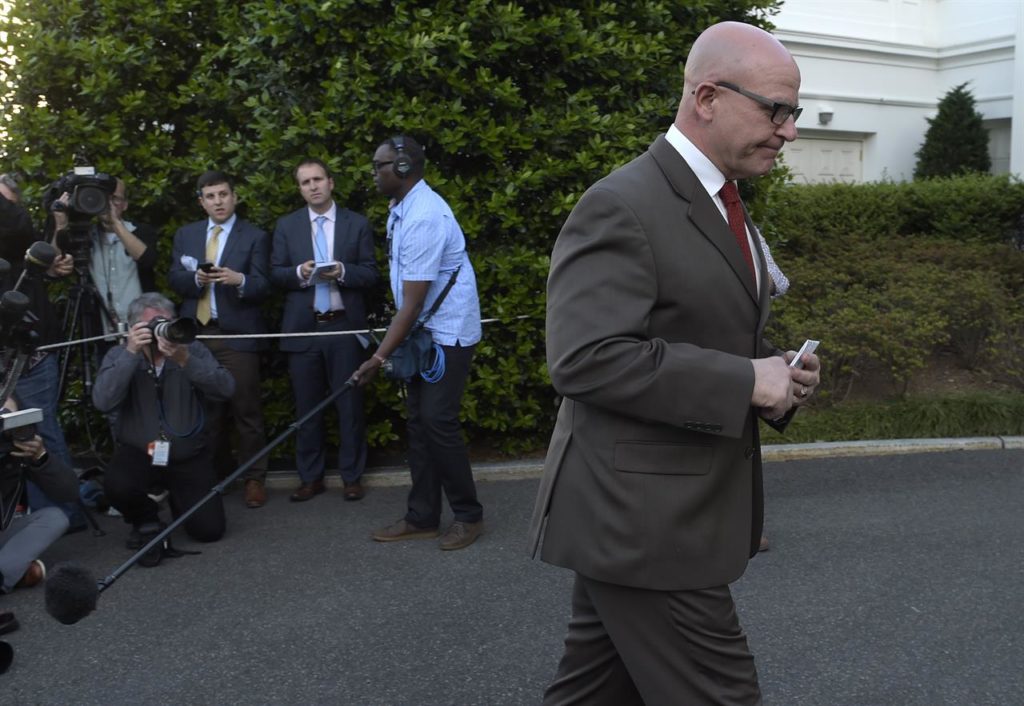
President Donald Trump defended revealing information to Russian officials, saying in a pair of tweets Tuesday that he shared “facts pertaining to terrorism and airline flight safety” and had “the absolute right” to do so. Trump was responding to reports Monday that he revealed highly classified information to senior Russian officials during an Oval Office meeting last week, putting a source of intelligence on the Islamic State at risk. But Trump tweeted that he shared the information for “humanitarian reasons, plus I want Russia to greatly step up their fight against ISIS & terrorism.” Trump says he wanted to share with Russia “facts pertaining to terrorism and airline flight safety.” He noted that as president, he has an “absolute right” to do this. The reports by The Washington Post and others drew strong condemnation from Democrats and a rare rebuke of Trump from some Republican lawmakers. White House officials denounced the report, saying the president did not disclose intelligence sources or methods to the Russians, though officials did not deny that classified information was disclosed in the May 10 meeting. The president and the foreign minister reviewed a range of common threats to our two countries including threats to civil aviation,” said H.R. McMaster, Trump’s national security adviser. “At no time, at no time were intelligence sources or methods discussed and the president did not disclose any military operations that were not already publicly known.” Secretary of State Rex Tillerson also disputed the Post report. He said Trump discussed a range of subjects with the Russians, including “common efforts and threats regarding counter-terrorism.” The nature of specific threats was discussed, he said, but not sources, methods or military operations. The Post, citing current and former U.S. officials, said Trump shared details about an Islamic State terror threat related to the use of laptop computers on aircraft with Russian Foreign Minister Sergei Lavrov and Russian Ambassador to the U.S. Sergey Kislyak. The ambassador has been a central player in the snowballing controversy surrounding possible coordination between Trump’s campaign and Russia’s election meddling. The anonymous officials told the Post that the information Trump relayed during the Oval Office meeting had been provided by a U.S. partner through an intelligence-sharing arrangement. They said it was considered so sensitive that details have been withheld from allies and tightly restricted even within the U.S. government. The New York Times and BuzzFeed News published similar reports later Monday. Russia’s foreign ministry spokesman denied the report. Maria Zakharova, a spokeswoman for the Russian foreign ministry, on Facebook on Tuesday described the reports as “yet another fake.” The revelations could further damage Trump’s already fraught relationship with U.S. intelligence agencies. He’s openly questioned the competency of intelligence officials and challenged their high-confidence assessment that Russia meddled in last year’s presidential election to help him win. His criticism has been followed by a steady stream of leaks to the media that have been damaging to Trump and exposed an FBI investigation into his associates’ possible ties to Russia. The disclosure also risks harming his credibility with U.S. partners around the world ahead of his first overseas trip. The White House was already reeling from its botched handling of Trump’s decision last week to fire James Comey, the FBI director who was overseeing the Russia investigation. A European security official said sharing sensitive information could dampen the trust between the United States and its intelligence sharing partners. “It wouldn’t likely stop partners from sharing life-saving intelligence with the Americans, but it could impact the trust that has been built, particularly if sharing such information exposes specific intelligence gathering methods,” said the official, who spoke on condition of anonymity because the person was not authorized to speak about such intelligence sharing. The revelation also prompted cries of hypocrisy. Trump spent the campaign arguing that his opponent, former Secretary of State Hillary Clinton, should be locked up for careless handling of classified information. The Post said the intelligence partner had not given the United States permission to share the material with Russian officials. By doing so, Trump would have jeopardized cooperation from an ally familiar with the inner workings of the Islamic State group, and make other allies – or even U.S. intelligence officials – wary about sharing future top secret details with the president. Afterward, White House officials took steps to contain the damage, placing calls to the CIA and the National Security Agency, the newspaper said. The CIA and the Office of the Director of National Intelligence declined to comment Monday evening. Congressional Republicans and Democrats expressed concern about the report. GOP Sen. Bob Corker of Tennessee, chairman of the Senate Foreign Relations Committee, told reporters the Trump White House “has got to do something soon to bring itself under control and order.” He described the White House as “on a downward spiral.” Senate Minority Leader Chuck Schumer of New York also called the story “disturbing,” adding, “Revealing classified information at this level is extremely dangerous and puts at risk the lives of Americans and those who gather intelligence for our country.” The controversy engulfed the White House. Reporters spent much of the evening camped out adjacent to Press Secretary Sean Spicer‘s office, hoping for answers. At one point, an eagle-eyed reporter spotted a handful of staffers, including Spicer and Deputy Press Secretary Sarah Huckabee Sanders, walking toward the Cabinet Room. Republished with permission of The Associated Press.
Pentagon’s Jim Mattis discussing war aims in Mideast this week
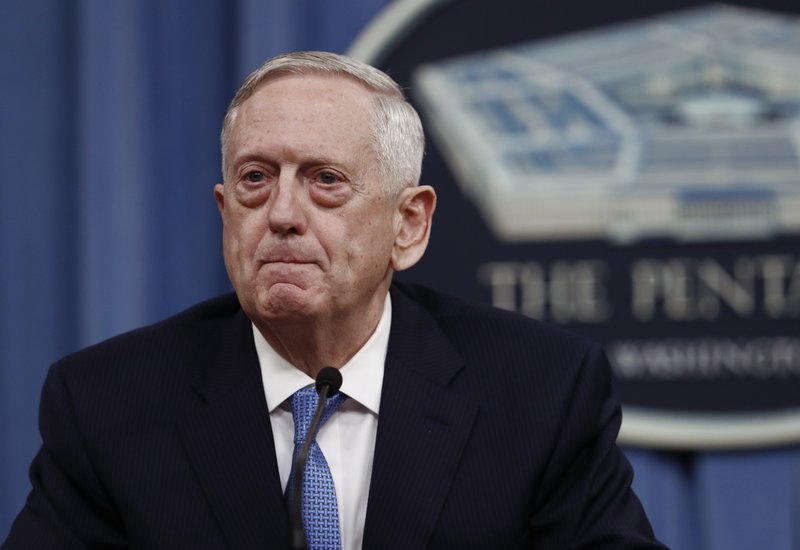
Defense Secretary Jim Mattis is looking to the Middle East and North Africa for broader contributions and new ideas to fight Islamic extremism as the Trump administration fleshes out its counterterrorism strategy. His trip to the region, which began with his departure Monday night, includes stops with longstanding allies Saudi Arabia and Israel, and new partners like Djibouti. As the administration enhances its efforts, Mattis has made a point of consulting counterparts around the world. His goals include expanding the American-led coalition against the Islamic State group in Iraq and Syria, but also combatting al-Qaida, whose Yemen branch is posing particular worry as it uses ungoverned spaces in the Arab world’s poorest country to plan attacks on the United States. In announcing Mattis’s trip, the Pentagon said last week he would be discussing ways to “defeat extremist terror organizations.” Mattis is starting his travels Tuesday in Riyadh, where he is expected to meet senior Saudi leaders. Saudi Arabia is leading a coalition that is fighting Iran-backed rebels in Yemen. The coalition’s airstrikes began two years ago but haven’t driven the Houthi rebels from the capital and large parts of Yemen they still control. The Trump administration is considering providing intelligence, aerial refueling and other military assistance to the United Arab Emirates, which is helping the Saudis. The U.N. says some 50,000 civilians have been killed or wounded in the three-year stalemate. Worries about IS aren’t limited to Syria and Iraq. Its influence has spread to Libya and elsewhere in North Africa. Mattis told a Pentagon news conference last week that he hoped to bring as many other nations as possible into the administration’s new strategy, which involves diplomatic and other non-military features. He said that plan was still in “skeleton form,” though it was being “fleshed out.” The Middle East’s landscape is getting more complicated. Syria’s alleged chemical weapons attack on April 4 prompted a U.S. cruise missile strike, temporarily slowing the pace of Washington’s air campaign against IS in northern Syria. And a U.S. airstrike April 11 killed 18 fighters associated with a U.S.-supported Syrian rebel group. Central Command said the U.S. strike was misdirected. Also last week, U.S. forces in Afghanistan struck an IS stronghold near the Pakistani border with the 11-ton “mother of all bombs,” the largest U.S. non-nuclear bomb ever used in combat. The Middle East is familiar turf for Mattis, a Marine veteran of the Iraq war who rose to four-star rank. He finished his military career as head of Central Command, which directs U.S. military operations across the Middle East and Central Asia. On his weeklong trip, Mattis also is scheduled to visit Egypt and Qatar, the small Arab country that hosts the U.S. military’s main Mideast air operations center. It will be his first trip to these countries since taking office in January. He also will make a brief stop at Camp Lemonnier in Djibouti in the Horn of Africa, which the U.S. uses to fly sensitive drone missions over Somalia and Yemen. Mattis visited Iraq in February on his first trip to the Middle East as Pentagon chief. Republished with permission of The Associated Press.
US commander signals larger, longer US presence in Syria
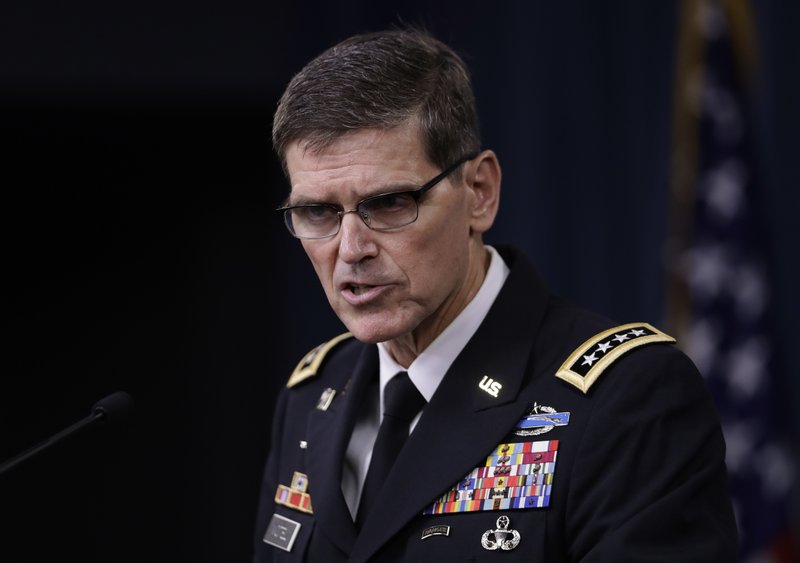
The top U.S. commander in the Middle East signaled Thursday that there will be a larger and longer American military presence in Syria to accelerate the fight against the Islamic State group and quell friction within the complicated mix of warring factions there. Gen. Joseph Votel, head of U.S. Central Command, told senators Thursday that he will need more conventional U.S. forces to insure stability once the fight to defeat Islamic State militants in their self-declared capital of Raqqa is over. The U.S. military, he said, can’t just leave once the fight is over because the Syrians will need help keeping IS out and ensuring the peaceful transition to local control. Votel’s testimony to the Senate Armed Services Committee comes as up to 400 U.S. forces have moved into Syria in recent days. Well more than half of those are Marines, bringing in large artillery guns for the Raqqa fight, and the rest are Army Rangers who went into northern Syria to tamp down skirmishes between Turkish and Syrian forces near the border. The numbers have been fluctuating, often on a daily basis, as troops move in and out. “I think as we move towards the latter part of these operations into more of the stability and other aspects of the operations, we will see more conventional forces requirements,” Votel said. Until recently, the U.S. military presence in Syria was made up of special operations forces advising and assisting the U.S.-backed Syrian troops. It will be critical, Votel said, to get humanitarian aid, basic working services and good local leaders in place in Raqqa so that businesses can return and the city can move on. He also told senators that the U.S. is looking for options to ease the tensions with Turkey over the plan to use U.S.-backed Syrian Kurds in the fight to oust Islamic State fighters from Raqqa. But he offered no details on what those options could be. The U.S. is considering arming the Syrian Kurdish forces, which the Pentagon considers the most effective fighters against IS militants in northern and eastern Syria. But Turkey, a key NATO ally, considers the Syrian force, known as the YPG, a terrorist organization. Turkey wants to work with other Syrian opposition fighters known as the Free Syrian Army to liberate Raqqa. Pentagon leaders sent a new plan to defeat IS to the White House late last month that included a variety of options for the ongoing fight in Iraq and Syria. The White House hasn’t yet approved the plans, but the recent deployments into Syria suggest that President Donald Trump may be leaning toward giving the Pentagon greater flexibility to make routine combat decisions in the IS fight. Military commanders frustrated by what they considered micromanagement under the previous administration have argued for greater freedom to make daily decisions on how best to fight the enemy In separate comments, Votel also reaffirmed that more American forces are needed in Afghanistan, a point the top U.S. commander in that country made to Congress several weeks ago. Votel agreed that the fight against the Taliban is in a stalemate, and said “it will involve additional forces” to ensure the U.S. can better advise and assist the Afghan forces. U.S. Gen. John Nicholson, the top American commander in Afghanistan, told the Senate Armed Services Committee last month that he needs a few thousand more troops to help end the stalemate there. And Defense Secretary Jim Mattis said in recent weeks that he will make decisions soon on whether to recommend an increase in the U.S. force. Republished with permission of The Associated Press.
Donald Trump signals changes to US interrogation, detention policy
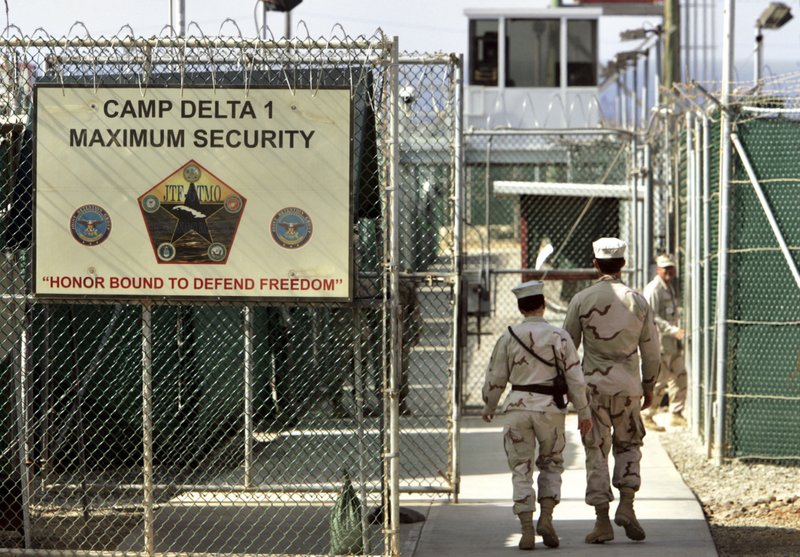
President Donald Trump‘s renewed embrace of torture in the fight against Islamic extremism sets up a heated dispute with a long line of opponents both at home and abroad of Bush-era interrogation policies and CIA-run “black site” prisons. “We have to fight fire with fire,” Trump told ABC in an interview aired Wednesday after The Associated Press and other news organizations obtained a copy of a draft executive order that signals sweeping changes to U.S. interrogation and detention policy. The draft order would reverse President Barack Obama’s order to close the military detention center at Guantanamo Bay, Cuba — a place Trump has said he wants to fill up “with bad dudes.” It orders up recommendations on whether the U.S. should reopen CIA detention facilities outside the United States. Critics said the clandestine sites marred America’s image on the world stage. The draft directive also orders a review of interrogation methods used on terror suspects and calls for suggested modifications that would not violate the U.S. legal ban on torture. Trump, who has pushed for tougher interrogation techniques, said he would consult with new Defense Secretary James Mattis and CIA Director Mike Pompeo before authorizing any new policy. But he said he had asked top intelligence officials: “Does torture work? And the answer was ‘Yes, absolutely.’” Mattis and Pompeo did not know about the draft executive order, according to a congressional aide who was not allowed to publicly discuss the matter and spoke on condition of anonymity. When asked specifically about waterboarding, an interrogation method that simulates drowning, Trump cited the extremist group’s atrocities against Christians and others and said he wanted to do “everything within the bounds of what you’re allowed to do legally.” Provisions of the draft order are not surprising based on Trump’s remarks on the campaign trail. Trump spoke emphatically about toughening the U.S. approach to fighting Islamic State militants, saying he would re-authorize waterboarding and a “hell of a lot worse.” However, many intelligence and military officials, human rights groups and both Democratic and Republican lawmakers have widely disputed Trump’s claim that harsh interrogation methods are effective in getting critical intelligence from detainees. The AP obtained the draft order from a U.S. official, who said it had been distributed by the White House for consultations before Trump signs it. The official wasn’t authorized to speak publicly on the matter and spoke on condition of anonymity. Trump spokesman Sean Spicer said the draft order was “not a White House document.” House Speaker Paul Ryan said it was his understanding that the draft order was written by someone who had earlier worked on the Trump transition team. “This is not something the Trump administration is planning on, working on,” Ryan said. Whatever changes to U.S. interrogation and detention policy that Trump eventually proposes will face political, practical and statutory hurdles. Republican Sen. John McCain of Arizona, who was beaten as a prisoner during the Vietnam War, will be Trump’s most formidable foe on Capitol Hill. “The president can sign whatever executive orders he likes. But the law is the law. We are not bringing back torture in the United States of America,” said McCain, chairman of the Senate Armed Services Committee. After the Sept. 11, 2001, attacks, President George W. Bush authorized a covert program that led to dozens of detainees being held in secret locations overseas and to interrogation tactics that included sleep deprivation, slapping and slamming against walls, confinement in small boxes, prolonged isolation and even death threats. Three detainees faced waterboarding. Many developed psychological problems. Elisa Massimino, president of Human Rights First, said: “America paid a high price for its trip to the dark side. Our allies grew reluctant to cooperate with us and our enemies gained a potent recruitment tool that drew foreign fighters to the battlefield who killed American soldiers.” While some former government officials insist the program was effective, many others say the abuses weakened America’s moral standing in the world and hurt morale among intelligence officers before Obama shut it down. They say harsh interrogation techniques break down trust with a suspect and often prompt them to say anything to stop the harsh treatment. Retired General Charles C. Krulak, former commandant of the Marine Corps, said reviving torture is illegal, harms U.S. national security and betrays American ideals. Krulak was one of 176 retired high-ranking officers, including 33 four-star generals and admirals, who sent a letter to Trump in October urging him to denounce torture. Besides scrapping Obama’s order to close Guantanamo, the draft order would revoke other Obama directives that closed the CIA detention facilities, gave the International Red Cross timely access to all detainees and prohibited the U.S. from using any interrogation technique not listed in the Army Field Manual. Among the interrogation techniques banned by the manual were forced nakedness, hooding, beatings, sexual humiliation, threatening with dogs, mock executions, electric shocks, burning and waterboarding. Wanting to ensure that no future president could simply tear up that order, McCain teamed up with Sen. Dianne Feinstein, D-Calif., to turn it into law. Their anti-torture amendment, which was adopted in a 78-21 bipartisan vote and became law late last year, requires the Army to conduct a review of the field manual every three years in consultation with the attorney general, the FBI director and the director of national intelligence. The first review deadline is Dec. 19. Trump could rewrite the field manual to include harsher interrogation techniques, but whatever is added cannot “involve the use or threat of force,” according to the current law. That could bring the argument down to the definition of whether waterboarding or extreme stress positions, for example, constitute a “use or threat of force,” said Robert Chesney, professor at the University of Texas School of Law. Pompeo, Trump’s CIA director, said in his confirmation hearing that he would abide by all laws. But he also said he’d consult with CIA and other government experts on whether current restrictions on interrogation were an “impediment to
U.S.-led coalition doubles number of advisers in Iraq to 450
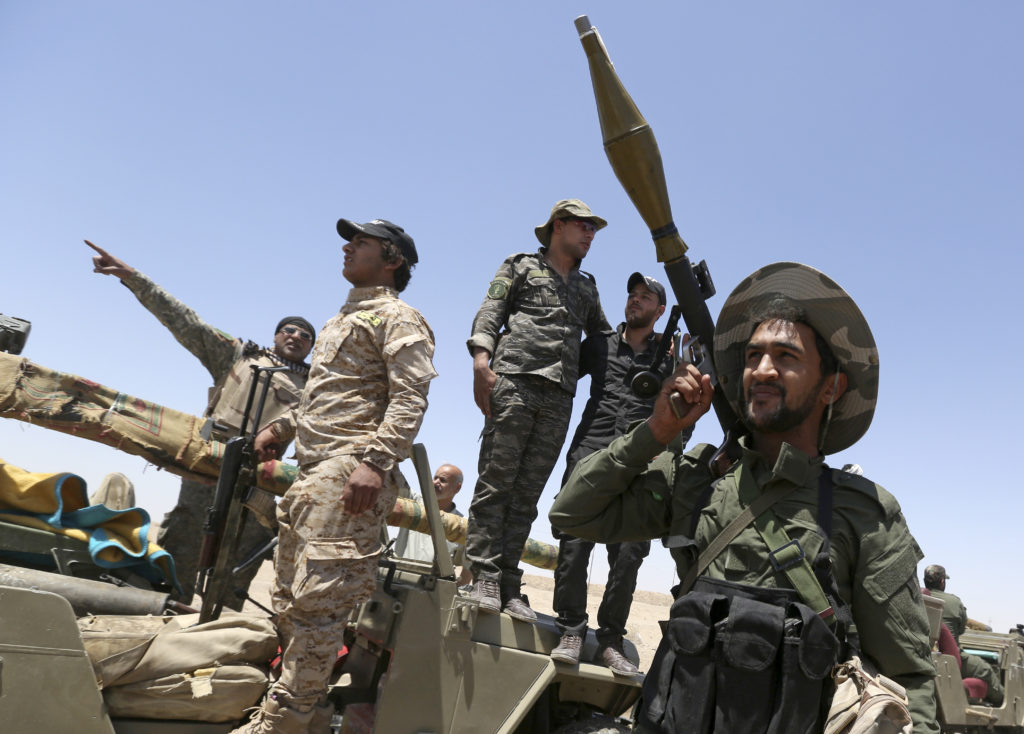
A U.S. military spokesman says the number of American and coalition advisers in Iraq has doubled in the past couple of weeks as Iraq pushes to recapture the Islamic State stronghold of Mosul. U.S. Air Force Col. John Dorrian says there are now about 450 coalition advisers in Iraq. Dorrian says an unspecified number of those advisers have been inside Mosul occasionally as part of the expanding effort to support Iraqi security forces as they fight dug-in militants. The advisers aren’t involved in direct combat, but are meant to provide specialized support such as analysis of intelligence. The Pentagon says there are 4,935 U.S. troops in Iraq, including trainers and other support forces. Dorrian spoke to Pentagon reporters Wednesday from his headquarters in Baghdad. Republished with permission of the Associated Press.
Donald Trump re-calibration: First act as President – ask Congress to declare war on ISIS

In case you missed it, the U.S. has been fighting an unconstitutional, undeclared war against Islamic terrorist enemies around the globe since 9/11. Its cost has been bleeding the American treasury and has depreciated the influence of America as the believable leader of the free world. When he takes office, Donald Trump’s first act as president should be to legitimize the prosecution of this war on Islamic terrorism by heading down Pennsylvania Avenue and asking Congress to legally declare war against ISIS. Trump’s mandate from the American electorate was premised in part on using unrestrained American military power to defeat ISIS and making “American Great Again” by building back and expanding US military capabilities and reach around the world. At the same time, Trump also has promised to bring a more restrained use of American interventionism. “We wanna strengthen all friendships and seek out new friendships,” Trump said at a postelection rally in Fayetteville, North Carolina. “Rather than a rigid dogma, we’re guided by the lessons of history, and a desire to promote stability all over and strength in our land. This destructive cycle of intervention and chaos must finally, folks, come to an end.” By asking for a declaration of war against ISIS (and al-Qaida too), President Trump would deliver on his promise not only to allow the United States to use the power and military might necessary to defeat these Islamic terror groups, but to actually illustrate that he is willing to restrain his presidential power to act alone in prosecuting and defining this war. Trump would also set a mission to actually end what has been an unwinnable war. This “War on Terror” as it stands today is an endless, illegal war, one whose mission, goals and objectives have never been truly defined with a declaration of war mandated both by the U.S. Constitution and the War Powers Act. It has been an undemonstrative series of military actions in a number of different nations of no true definition or ideology to measure victory or defeat. Both our soldiers and their generals have been severely restrained by the Obama administration’s adoption of a military strategy based on weak internationalist doctrine and coalitions, political correctness defined by leftist elites and journalists, and an irrational obsession with restricting civilian casualties that rule out the extreme force necessary to carry out the destruction of enemy – and its supporters too. It’s been a half-assed, stupid way of fighting a war. At the same time, Americans have become too accustomed, even complacent, to this eternal state of war. After 9/11, we were all riled up in a very patriotic way and told to be ready and observant. But after years of fighting that has accomplished little in terms of beating the enemy that is not allowed to be defined in real terms, our government now discounts its true threat to the American people and to diminish the significance and true costs of this state of war. Sadly, while we send drones and the USAF to bomb targets in the Middle East, we have deferred to the Russians, the Saudis, and the Iranians to directly deal with ISIS, to sort out the messes in Syria and Yemen. Even worse, at home, terrorist attacks such as the shootings at Fort Hood in 2009, the Boston Marathon bombing in 2013 and the San Bernardino attack in 2015 and the recent bombing in Manhattan in September are incorrectly termed as criminal matters. Couched cynically as acts by psychologically demented individuals acting alone, these acts of war by international terrorists quickly disappear from the news cycle and the consciousness of a nation. By definitively defining the enemy, an unrestrained scope of waging war, and the cost in blood and coin Americans need to suffer to eliminate a true threat to world stability and American democracy, a declaration of war would be both a defining moment for a new Trump Administration and a needed re-calibration of how our nation is governed and addresses this threat. It would be a truly significant first step in making “America Great Again.” ___ Steven Kurlander blogs at Kurly’s Kommentary and writes for FloridaPolitics.com. He is an attorney and communications specialist living in Monticello, New York. He can be reached at kurlyskommentary@gmail.com.


